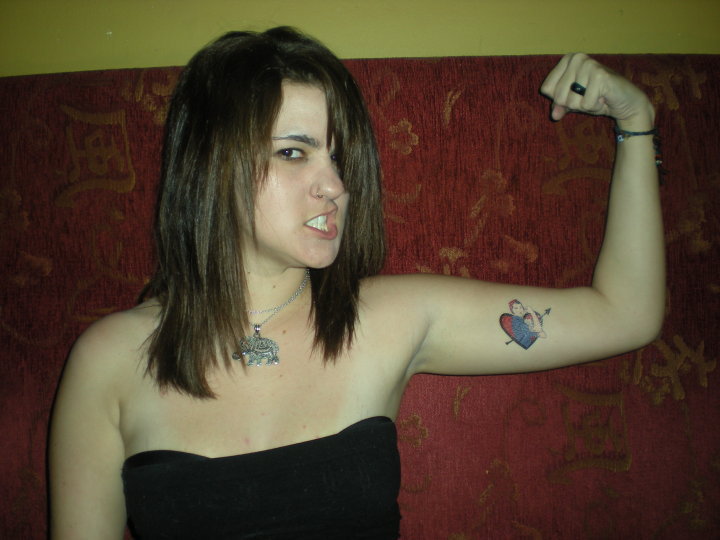
Die, die, die my darling
Don't utter a single word
Die, die, die my darling
Just shut your pretty eyes
I'll be seeing you again
Yeah, I'll be seeing you, in hell
So don't cry to me oh baby
Your future's in an oblong box
Don't cry to me oh baby
You should have seen it a-coming on
Don't cry to me oh baby
Had to know it was in your card
Don't cry to me oh baby
Dead-end soul for a dead-end girl
Don't cry to me oh baby
And now your life drains on that floor
Don't cry to me oh baby
I picked this song because I had heard it before. It was originally recorded by a band called The Misfits, and was released in 1984. My Dad listened to a lot of Misfits throughout my childhood, and also listened to the cover version by Metallica. I grew up to also like The Misfits- I’ve known the words to this song for years and because of that fact, this song is the perfect example, for me, of the normalization of violence (and particularly violence against women) in the media. I’ve sung and hummed along with this song since a young teenager, most of the time not even thinking about what the lyrics were talking about. They’re pretty repetitive and less-than-nuanced, which only adds to my surprise that the scariness of the lyrics never occurred to me before.
First, the singer tells someone he refers to as “his darling” to “die, die, die.” We can infer that the person he addresses is someone close to him, maybe an intimate partner. He continues, saying that his victim should shut their pretty eyes, and that he’d see them again in hell. The implied question is, what did the other person do to deserve hell? The singer goes on to say that his “baby’s” future is in an oblong box, that they should have seen the violence coming and that now their “life drains on the floor.” We can piece together that his victim is female from the line “dead-end soul for a dead-end girl.” With very little extrapolation of the existing information provided by the song lyrics, we can tell that it speaks of a woman killed for some perceived offense against someone that she was intimate with. He believes that she deserves it (“I’ll be seeing you in hell”). He believes the contradictory ideas that she both caused it AND that it was inevitable, an illogical combination that absolves the individual who committed the violent actions from all responsibility and feelings of guilt. We are meant to blame the victim for her own brutalization (Kirk 265). We are meant to share in the singer’s gleeful satisfaction that the party at fault has been dealt just retribution for her offenses. In addition, the agency of the woman in the song is effectively stripped, as he demands that she “shut her mouth” and “don’t cry to me.” The woman has no voice. To argue, as many fans of the song probably would, that this is just a song and is not indicative of a larger trend of intimate partner violence would be to ignore the reality of the situation described by The Misfits. According to the government’s Office on Violence Against Women, 20 percent of teenage girls and young women have experienced some form of dating violence (261). The normalization of lyrics just like these contribute to fear felt every day by girls and women, and to the desensitization of men as a whole to the idea that violence is acceptable, as describes by John Stoltenberg in “I Am Not a Rapist!” (285).
Works Cited
Kirk, Gwyn and Okazawa-Rey, Margo. "Violence Against Women." Women's Lives: Multicultural Perspectives. 5th Ed. New York: McGraw-Hill, 2010. 257-271.
Stoltenberg, John. "I Am Not a Rapist!" Women's Lives: Multicultural Perspectives. 5th Ed.New York: McGraw-Hill, 2010. 285-290.

No comments:
Post a Comment